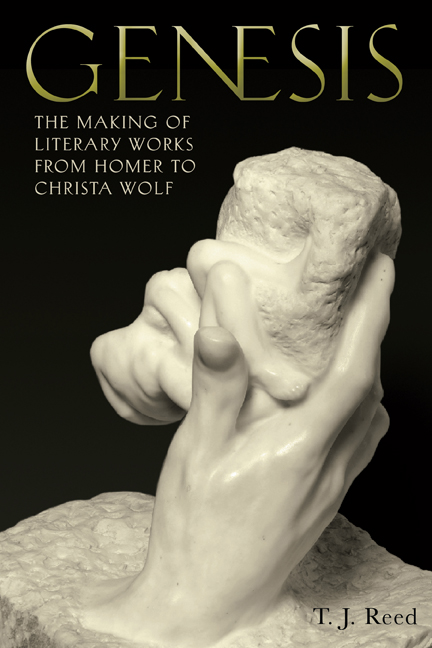Book contents
- Frontmatter
- Dedication
- Contents
- Note on Quotations and Translations
- Preface
- Introduction: Processes
- Part I Antiquity
- 1 Homer's Audiences: Shaping the Iliad (and the Odyssey)
- 2 Fourfold Genesis: The Bible between Literature and Authority
- Part II Early Modern
- 3 An Alphabet of Experience: Montaigne
- 4 Beginner's Luck: Shakespeare's History Cycles
- Transition—Tradition
- Part III Goethe
- 5 Cross-Purposes: Goethe's Faust
- 6 Occasions: Goethe's Lyric Poetry
- 7 Live and Learn: Werther and Wilhelm Meister
- Part IV Nineteenth- and Twentieth-Century German
- 8 Writing on the Run: Georg Büchner's Revolutions
- 9 “The Best-Laid Schemes…”: Thomas Mann Unplanned
- 10 Description of a Struggle: Kafka's Half-Escape
- 11 Atomic Beginnings: Brecht, Galileo, and After
- 12 Knowing and Partly Knowing: Paul Celan's Mission
- 13 Christa Wolf: A Fall from Grace
- Afterword
- Notes
- Bibliography
- Index
13 - Christa Wolf: A Fall from Grace
Published online by Cambridge University Press: 16 September 2020
- Frontmatter
- Dedication
- Contents
- Note on Quotations and Translations
- Preface
- Introduction: Processes
- Part I Antiquity
- 1 Homer's Audiences: Shaping the Iliad (and the Odyssey)
- 2 Fourfold Genesis: The Bible between Literature and Authority
- Part II Early Modern
- 3 An Alphabet of Experience: Montaigne
- 4 Beginner's Luck: Shakespeare's History Cycles
- Transition—Tradition
- Part III Goethe
- 5 Cross-Purposes: Goethe's Faust
- 6 Occasions: Goethe's Lyric Poetry
- 7 Live and Learn: Werther and Wilhelm Meister
- Part IV Nineteenth- and Twentieth-Century German
- 8 Writing on the Run: Georg Büchner's Revolutions
- 9 “The Best-Laid Schemes…”: Thomas Mann Unplanned
- 10 Description of a Struggle: Kafka's Half-Escape
- 11 Atomic Beginnings: Brecht, Galileo, and After
- 12 Knowing and Partly Knowing: Paul Celan's Mission
- 13 Christa Wolf: A Fall from Grace
- Afterword
- Notes
- Bibliography
- Index
Summary
GENESIS IS ONLY COMPLETE when a work is published. Up to that point, it doesn't exist beyond the author's desk; at that point it becomes a literary reality. The date of publication is usually not important, or matters at most to a particular slice of the public, fans impatient for an expected new work. The date isn't likely to be critical, certainly not a main focus of criticism, and even less likely to transform the author's whole reputation and public standing. But that is what happened to Christa Wolf over a late, slight novella. The affair broadened into an attack on East German writers generally, a major contribution to the bitterness of that unsettled time after the fall of communism, the “Wende,” then further into an attempted reckoning with all postwar German literature, West German writers included, on the grounds that they had given politics priority over art. Her small book was thus a significant catalyst to a broader, fierce East/West debate, and constitutes a substantial case with which to end this volume.
With the collapse of communism across Europe and the fall of the Berlin Wall in 1989, Christa Wolf at last decided to publish Was bleibt, an account written in 1979 of a writer's experience of surveillance by the East German secret police, or Stasi. Its record of the pressures used to intimidate citizens could not have been published in the East while “real existing socialism” still existed. On the other hand, to have published it across the border in the West would have been an absolute break with the East German state and would almost certainly have meant Wolf having to emigrate to West Germany, as many writers had chosen or been forced to do. So the story stayed in her desk. Writing for the desk drawer in oppressive circumstances has been in modern times practically a literary genre in itself.
All Wolf's previous work had come out in both Germanies. She was reluctant to publish anything that could not appear on both sides of the divide.
- Type
- Chapter
- Information
- GenesisThe Making of Literary Works from Homer to Christa Wolf, pp. 231 - 238Publisher: Boydell & BrewerPrint publication year: 2020



